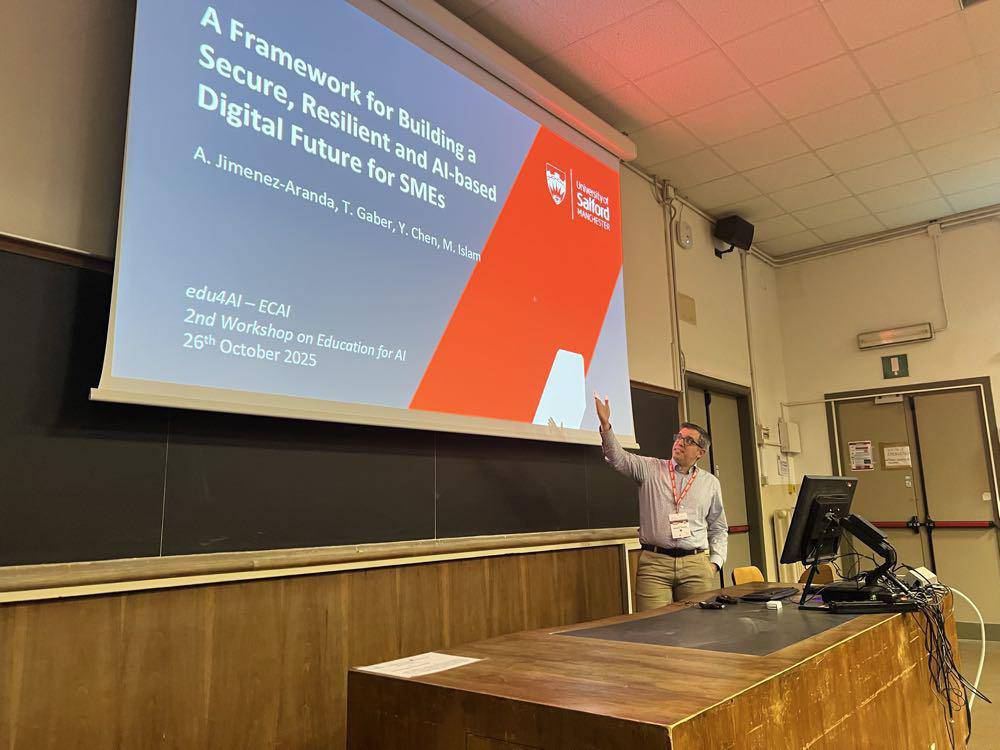At this year’s European Conference on Artificial Intelligence (ECAI 2025), Dr Angel Jimenez-Aranda from Salford Business School presented his latest research at the edu4AI workshop. His talk, titled “A Framework for Building a Secure, Resilient and AI-based Digital Future for SMEs”, explored how small and medium-sized enterprises (SMEs) can embrace artificial intelligence (AI) while staying secure, resilient, and inclusive in a rapidly evolving digital landscape.
From research to real-world impact
This presentation built on the findings of the AI-Cyber Nexus project, an initiative led by Angel in collaboration with Yun Chen and Mirage Islam from Salford Business School, together with Tarek Gaber from the School of Science, Engineering and Environment (SEE). The project aimed to help SMEs in Greater Manchester strengthen their digital capabilities by understanding both sides of the AI–cybersecurity relationship: how AI can be used to defend against cyber threats, and how AI systems themselves can introduce new vulnerabilities.
“AI is transforming how businesses operate, but for SMEs, the line between opportunity and risk is getting thinner,” Angel explained. “Our framework helps organisations navigate this space, combining innovation with security, and growth with resilience.”
The AI-Cyber Nexus framework
The framework presented by Angel is the result of extensive engagement with SMEs and regional partners. It brings together insights from previous initiatives, such as the Cyber Foundry and AI Foundry programmes, and focuses on the interconnection between AI adoption and cybersecurity preparedness.
It is structured around four complementary dimensions that together offer a practical roadmap for SMEs:
- Awareness and engagement: helping business leaders understand both the opportunities and the risks of AI. Through workshops, webinars, and accessible communication, this dimension demystifies complex technologies and raises awareness about emerging cyber threats, such as data poisoning or adversarial attacks.
- Skills and capability development: addressing the well-documented skills gap in AI and cybersecurity by creating flexible learning pathways for SMEs. This includes modular training, and simple, jargon-free resources designed to meet businesses where they are, regardless of sector or size.
- Hands-on support and expert guidance: offering SMEs personalised advice through one-to-one consultancy. This ensures that SMEs receive practical, context-sensitive support, helping them adopt AI securely without overwhelming their existing resources.
- Inclusivity and diversity: woven throughout the entire framework, this dimension promotes equal participation and representation in AI and cybersecurity. It highlights diverse role models, supporting women and minority groups, and helping to build a more equitable digital ecosystem aligned with national and UN goals for diversity in STEM.
By integrating these four elements, the framework supports responsible AI adoption and ensures that security and inclusivity are built into digital transformation from the very start.
Why this matters for SMEs
SMEs often face a dual challenge: they are encouraged to innovate with AI but lack the confidence, resources, or expertise to do so securely. The AI-Cyber Nexus framework responds directly to this gap by combining awareness, practical support, and inclusivity.
During its pilot phase in Greater Manchester, SMEs particularly valued the flexible design of the framework, allowing them to engage at their own pace through workshops, online materials, podcasts, and one-to-one guidance. Participants reported that the approach helped them understand AI’s potential while becoming more aware of cybersecurity threats specific to AI systems.
A regional initiative with national relevance
Although piloted in Greater Manchester, the framework aligns with broader national and international priorities, including the UK’s National AI Strategy and National Cyber Strategy, and can be adapted for other regions. It supports the UK’s ambition to build a secure, innovative, and inclusive digital economy where no SME is left behind.
Looking ahead
Angel’s ongoing work at Salford Business School continues to explore how AI and cybersecurity can work together to create resilient and inclusive digital futures. Following the success of the AI-Cyber Nexus project, the framework will continue to evolve, offering SMEs across the UK a practical pathway to harness AI confidently and securely.
